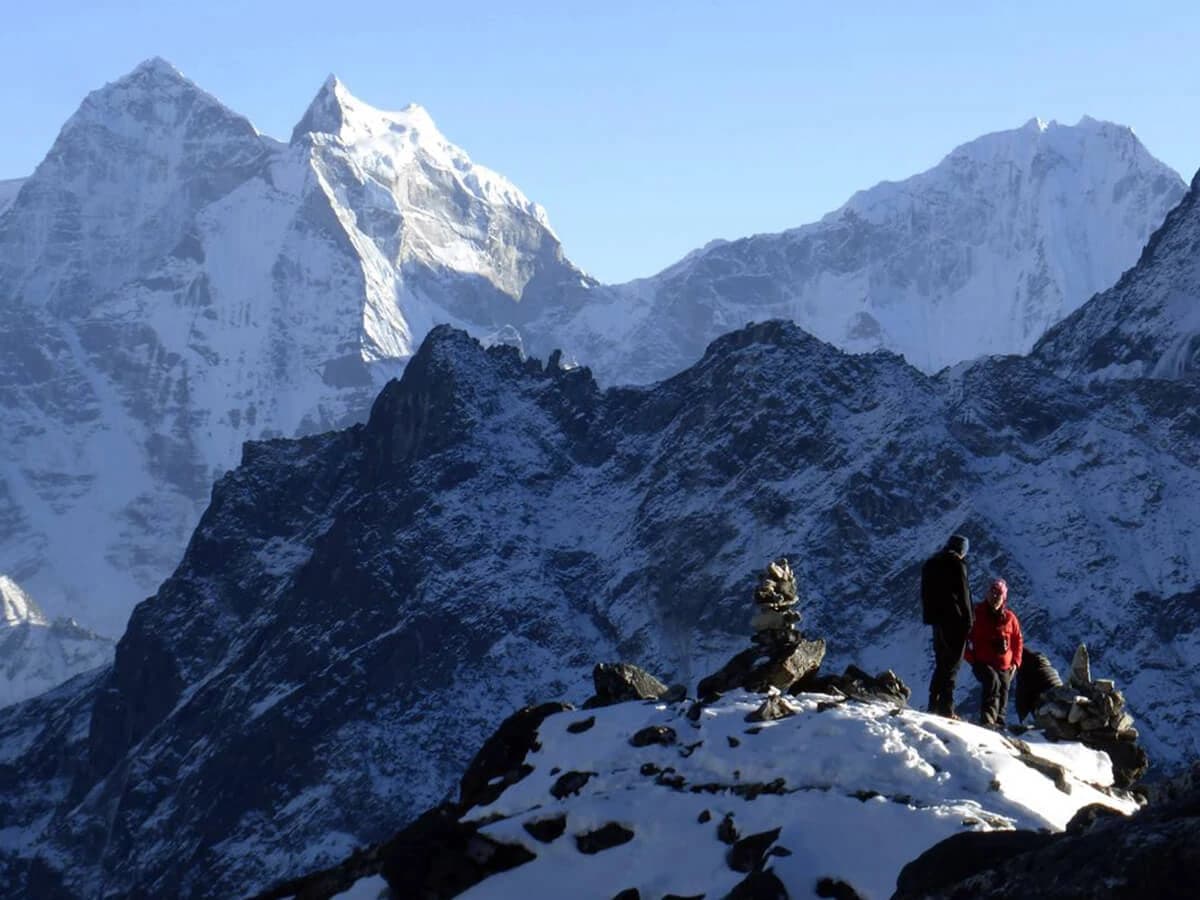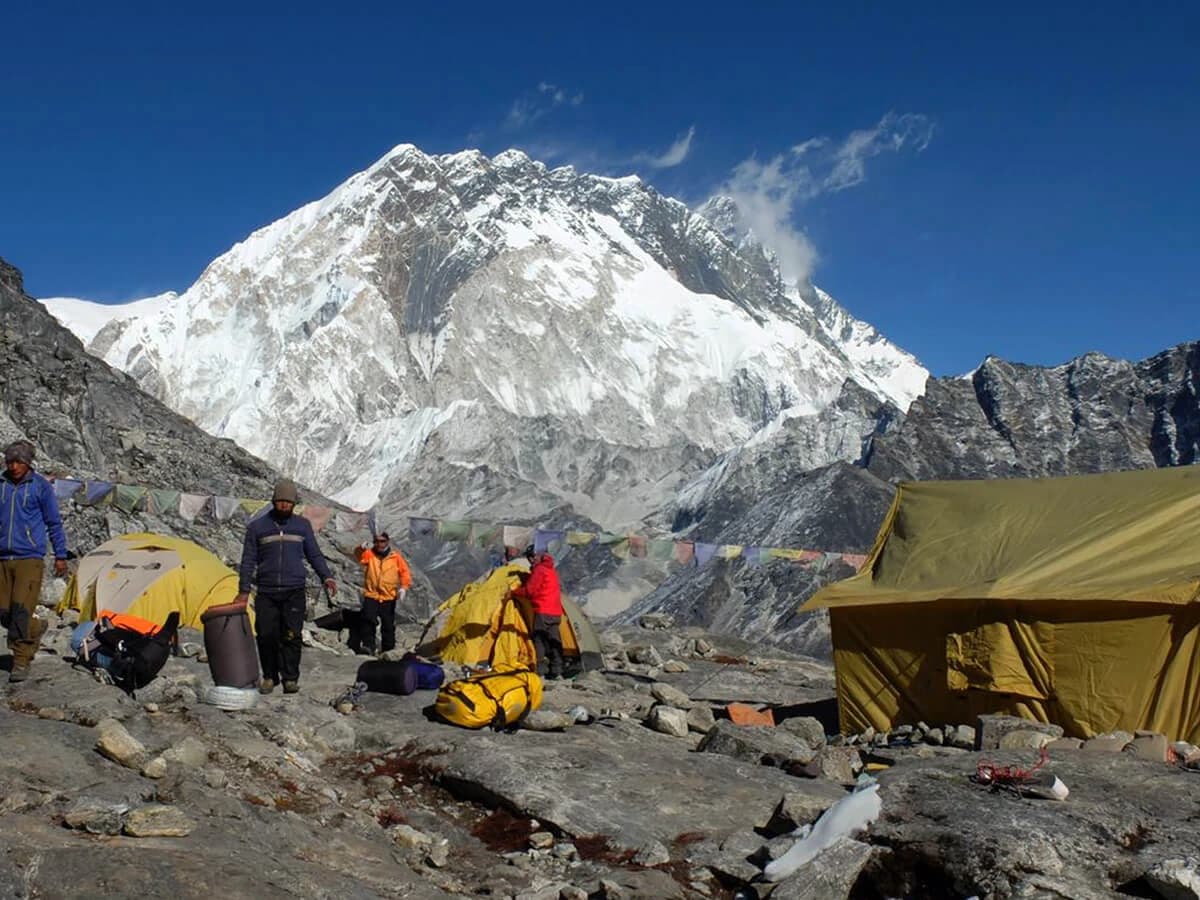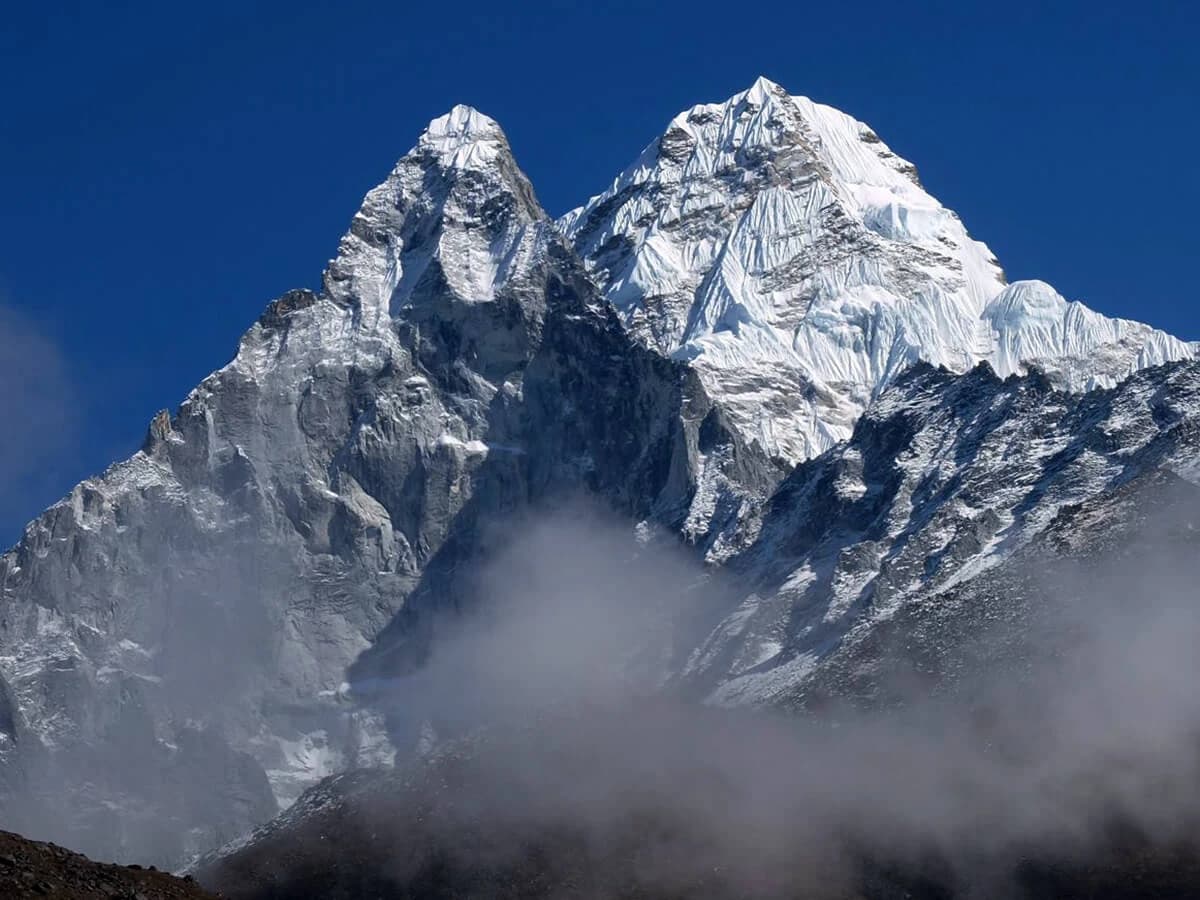The Everest Base Camp trek with Island Peak climbing is a thrilling journey that offers an amazing Himalayan adventure. This trekking and climbing in the Everest Himalayas of Nepal takes you through the heart of the Khumbu region, immersing you in the local Sherpa culture, the adrenaline-rushing high altitude, the legendary Everest Base Camp, and the iconic Island Peak (6,189 meters). The adventure and challenges based on the Everest Base Camp Trekking with Island Peak climbing itinerary of 18 days are well balanced, as in, while some portions are physically as well as mentally demanding, it is with the chance to view the raw beauty of the Himalayas that only a few get to appreciate and boast about. The 18-day Everest Base Camp Trek with Island Peak A climbing itinerary typically begins with a thrilling 20-minute flight from Manthali to Lukla and continues passing through the Sherpa villages like Phakding and Namche Bazaar. This is after two days in the Kathmandu Valley, so that you are well adapted to the Himalayan air of Nepal while you also visit some of the noteworthy cultural and heritage sites, at least seven of them even listed as UNESCO World Heritage Sites.
The epic Himalayan trip in Nepal from Kathmandu to reach the base camp of the highest mountain in the world and one of the majestic peaks above 6,000m continues through the Tengboche Monastery, Dingboche, and Lobuche along the classic Everest Base Camp Trekking route that once was trodden by mountaineering legends like Sir Edmund Hillary and Tenzing Norgay Sherpa. Including passing through tiny yet beautiful traditional mountain dwellings dominated by Sherpas, you will reach the adventure's paradise, Everest Base Camp at 5,364 meters altitude, offering expansive 360-degree views of the surrounding mountain peaks. Everest Base Camp is also the closest you would be to the almighty Mount Everest without summiting the peak itself, and while the closest view is from Kala Patthar (5,644m), as per recent updates. The Everest Base Camp Hiking and Island Peak Climb spring and autumn continues with the hike to the Chhukung, Island Peak base camp, and eventually to the top of Island Peak.
The Island Peak climbing involves making your way through glaciers, followed by steeply ascending and descending rugged terrains, adding much to the challenge. Often, the climbing route tends to get icy or snowy, while the final push rewards you with the best views of the Himalayas; trekkers and climbers get to experience the best fusion of unforgettable bittersweet moments. Skybound Adventure in this Everest Base Camp Trek with Island Peak Climbing Cost, we are offering early and group booking discounts for 2025 and 2026. We make your dream adventure come true. Our safety protocols are unparalleled, and our services match the international level at an affordable cost. Promising panoramic views of surrounding mountain peaks and the raw natural beauty near popular Everest trekking routes, the Everest Base Camp Trek with the Island Peak Climbing Package for 2025 and 2026 is a must-do!
What can you expect during the Everest Base Camp Trekking with Island Peak Climbing?
Regarded as a moderate to challenging Himalayan trip, the Everest Base Camp Trek with Island Peak Climbing is a journey to expect a physically and mentally demanding adventure that is no less scenic and rewarding in all terms. Naturally, culturally, and spiritually, as you ascend to the base of Mount Everest and begin summiting the iconic Island Peak (6,189m), also the highest point of the overall hiking journey, trekkers and climbers not only get to test themselves in rugged and remote Himalayas but also live humbling and awe-inspiring moments. As the sky, towering giants keep you inspired; local hospitality means you are in a home away from home, and when you are with Skybound Adventure, you are in the right hands for a hassle-free, safe, and everlasting Himalayan odyssey.
In mountain villages like Namche Bazaar, you get to experience vibrant Sherpa culture followed by Tengboche Monastery, while mountain giants like Everest, Lhotse, and Ama Dablam, especially from Everest Base Camp, Kala Patthar, Chhukung Ri, and Island Peak, are pure bliss to the eyes, added much by Khumbu Glacier and Khumbu Icefall. An adventure of a lifetime, the Everest Base Camp Trek with the Island Peak Climb, is a must. Including learning and practicing the use of ropes, ice axes, and crampons, it is just the perfect opportunity to embrace the moderately high-altitude trekking and climbing.
Everest Base Camp Trek with Island Peak Climbing—Is this trip right for you?
While there is no doubt that the combined trip to Everest Base Camp Trek with Island Peak Climbing is physically and mentally demanding, anyone who is used to high-altitude trekking and climbing with some weight on their back can take up the challenge. Especially ideal for people with extra spirit for adventure, if you want to immerse yourself in the perfect blend of high-altitude trekking and non-technical mountaineering in the center of the Everest Himalayas, the top of the world, the Everest Base Camp Trek with Island Peak Climbing is a must to add to your bucket list for 2025 and 2026. That is, if you are someone with a good level of physical fitness, best done by seasoned trekkers who do not suffer from any serious illness, trekking to Everest Base Camp with a climb to Island Peak is going to be rewarding. One of the best experiences in your life. Start preparing for the adventure 2-3 months before, build up your stamina, and embrace the beauty of changing weather; the paradise for trekkers and novice mountaineers awaits you in 2025 and 2026.
What should you pack for your Everest Base Camp Trekking with Island Peak climbing?
Appropriate packing with all essentials without stuffing is one of the key ingredients to a more easygoing, enjoyable, and memorable Himalayan voyage, including for this trek to Everest Base Camp and climb to Island Peak. Therefore, make sure you have all the necessary gear and equipment. Combining a classic route with adventure and a technical climb to Island Peak, you will need to include both trekking gear and mountaineering equipment in your backpack. Starting with the clothing, apply the layering principle, keep 2-3 moisture-wicking base layers, a fleece jacket for the mid-layer, and a water- and windproof jacket for the summit nights. A half-waterproof trekking pant, a sun hat, waterproof gloves, and a neck gaiter mean you are ready for the changing Himalayan weather.
A few pairs of trekking thermal socks with a nice pair of fitting light boots that have nice ankle support, lightweight shoes for the tea house, and harness, helmet, ice axe, crampons, and mountaineering gear keep you comfortable during overall high-altitude trekking and climbing. You can either buy this in Kathmandu, or if you want to pack your backpack light, you can rent it in Chhukung or Kathmandu. Additionally, carry a high-SPF sunscreen, UV-protection sunglasses, lip balm, a headlamp with extra batteries, a power bank, and a reusable water bottle with water purification tablets. As the trail can get rocky, a trekking pole for support and reducing fatigue on long ascents and descents is another must-have. Wet wipes, toothpaste, toilet paper, and a small towel ensure you have taken care of your hygiene. Last but not least, a backpack that can carry 30 to 40 liters. Pack smart, pack light with this checklist so you make the most of your combined hiking and climbing to Everest Base Camp with Island Peak.
How to prepare yourself for the Everest Base Camp Trek with the Island Peak climb?
The combined adventure to the Everest Base Camp and Island Peak is an unforgettable journey that requires both physical endurance and mental resilience. While the Everest Base Camp and Island Peak are accessible to everyone with a good level of physical conditioning, you may need some basic climbing skills for a smoother Island Peak climbing experience. Trekkers and climbers are expected to be well aware of challenges that come with high-altitude trekking and climbing, like altitude sickness, walking 6-8 hours daily for several days on varying landscapes, and unpredictable weather. Though the lower altitude may facilitate modern-day amenities like private rooms, wifi, hot showers, and varieties of meals along with charging devices at some additional cost, it gets extremely limited with increased altitude, and if you are traveling alone without a guide, things can get more challenging for you; hence, hiring a licensed guide is a must. A professional mountain guide looks after you during your entire 18 days of embarking on the Everest Base Camp Trek with Island Peak Climbing.
However, to make sure you have what it requires to make it successfully to Everest Base Camp and later on to the top of Island Peak, start both mental and physical training before the trek. Physically, you must start hiking, cycling, and swimming to increase stamina, strength, and adaptation to low oxygen levels, while mentally, you can practice yoga, meditation, and mindfulness for clarity. Familiarizing yourself with the trekking and climbing equipment, like rope handling, crampon use, trekking sticks, and other equipment, does make your trek a lot easier. While the trek may seem to be difficult, with proper training, acclimatization, and mental resilience, the Everest Base Camp Hiking with Island Peak Climbing is an astounding journey to test yourself for longer days of expedition, make memories for a lifetime, and live the moment many of us have dreamt of that only a few succeeded.
Set out on a Himalayan journey, discovering the raw beauty and Sherpa culture - Everest Base Camp Trek with Island Peak Climbing
Imagine walking through the ancient Sherpa village, where the colorful prayer flags are fluttering, and walking through nature's raw beauty, enjoying the Himalayas' panoramic views. Picture yourself waking up with a warm cup of tea and a breathtaking view of the Himalayas. If you want to turn this imagination into reality, the Everest Base Camp Hike and Island Peak climbing trek is here for you. With Skybound Adventure, you are not just trekking to Everest Base Camp and Island Peak, but you are also making unforgettable memories and immersing yourself in the beauty of Nepal. Our Everest Base Camp Trek with Island Peak Climbing Package is handpicked and carefully crafted by a group of experts so you have the perfect blend of serene natural beauty with cultural connection, including in the years 2025 and 2026. Our experienced local licensed guide will not only lead you to Everest Base Camp and Island Peak, but they will also tell you stories about the spirit of the mountains. If you are ready to do this adventurous and challenging trek to breathe in the fresh mountain air while walking on the ancient route, discovering the unspoiled beauty, the Everest Base Camp Trek with Island Peak Climb is here for you to conquer. For a safer, more secure, and more unforgettable trekking and climbing experience, stay in touch with us at Skybound Adventure!


